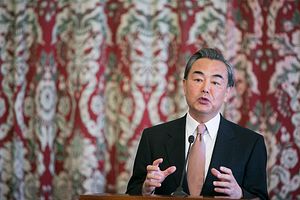This week’s visit to Australia by Chinese Foreign Minister Wang Yi provided a signal that the relationship between the two countries is continuing to strengthen. Wang met with both Prime Minister Malcolm Turnbull and Foreign Minister Julie Bishop to discuss issues of trade and strategic importance in what both ministers described as “uncertain times.” The primary event of the visit was the Diplomatic and Strategic Dialogue held on Monday. This was the fourth such dialogue between the countries, and is now an annual fixture.
In 2016 China continued to extend its position as Australia’s largest trading partner, with two-way trade between the countries reaching AUD $150 billion (US$114.5 billion). Since China overtook Japan as Australia’s largest trading partner in 2007, Australia has, for the first time in its existence, been placed in a situation where its most important trading relationship is not with a strategic ally. This situation creates a significant amount of consternation among foreign policy analysts as to how Australia will balance its security and economic requirements.
After the now infamous phone call between Turnbull and U.S. President Donald Trump, Australia’s dilemma became a little more pronounced. That Wang’s visit to Australia was his first international trip following Chinese New Year suggests that Australia is of growing importance to China, and adds a little more intrigue to Australia’s foreign policy calculations.
However, at a press conference in Canberra on Monday both foreign ministers were keen to play down any hypotheticals that might emerge from Trump’s presidency, with Wang stating, “What we assess is the official policy statement, made by the administration after inauguration, not campaign rhetoric, not some remarks made years ago.”
Instead, Wang preferred to refer to the unconventional new U.S. administration implicitly, rather than overtly. Echoing President Xi Jinping’s Davos speech on China’s commitment to free trade, Wang stressed that “at a time when we face an international situation that is full of uncertainties, we agree to send a clear message that is it is important to firmly commit to an open world economy.” He further added, “We need to firmly uphold the international trading regime with the WTO at the core and we need to promote trade and investment liberalization and facilitation and we need to take a firm stand against all forms of protectionism.”
Bishop in turn chose to highlight Australia’s commitment to its trading relationship with China: “At a time of economic transition and uncertainty around the world, Australia reassures China that we are a reliable partner and that we will continue to place a strong trade and economic relationship as one of our highest priorities.”
Australia remains committed to pursuing deeper economic engagement in the Asian region. While Bishop suggested that China should consider joining the Trans-Pacific Partnership (TPP) after the withdrawal of the United States, the Chinese seem reluctant to pursue this. However, Wang and Bishop discussed in private the Regional Comprehensive Economic Partnership (RCEP) trade pact that is being coordinated by ASEAN, and involves Australia, China, India, Japan, the Republic of Korea, and New Zealand alongside the ASEAN states.
On the issue of China’s increasing militarization of the South China Sea, Bishop simply confirmed a commitment to the present maritime norms, stating that “Australia doesn’t take sides on competing territorial claims, we have a strong interest in unimpeded trade and regional peace, freedom of navigation and freedom of overflight, and respect for international law.” However, she did reveal that she had discussed the issue with the new U.S. Secretary of State Rex Tillerson, adding, “We discussed the importance of maintaining adherence to the international rules based order, under which many nations, including China and other countries in our region, have been able to grow and prosper.”
The sober discussion between Bishop and Tillerson would be a great relief to the Australian government, which would have been seriously unnerved by Trump’s aggressive posture toward Turnbull. While there is an impetus to try and talk up the relationship Australia and China after the phone call between Turnbull and Trump, in terms of a security and strategic relationship Australia remains firmly tied to the United States as the state most capable of providing regional security, despite its increasing friendliness and economic dependence on China.
However, with the shock of Trump’s actions the Australian government may now be more wary of any further inconsistencies from the White House and seek to subtly strengthen its ties with other major states like China — just in case the Trump administration makes any dramatic moves that the next U.S administration cannot easily undo.

































